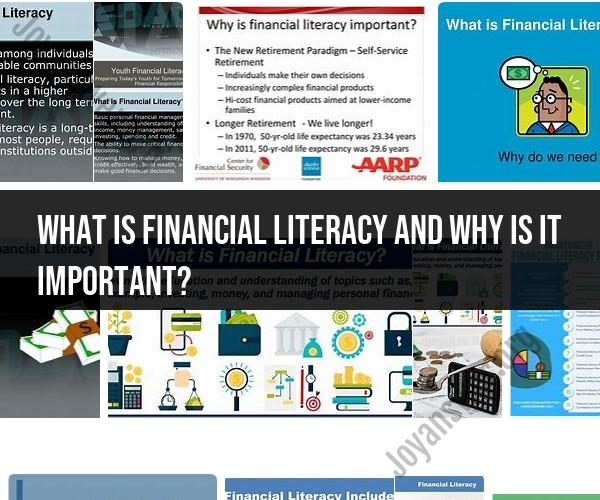What is financial literacy and why is it important?
Financial literacy refers to the knowledge and understanding of various financial concepts, tools, and practices that individuals need to make informed and effective decisions about their personal finances. It encompasses a range of topics, including budgeting, saving, investing, managing debt, understanding financial products and services, and planning for the future. Financial literacy is essential for individuals to navigate the complex world of personal finance and achieve their financial goals.
Here are some key reasons why financial literacy is important:
Financial Empowerment: Financial literacy empowers individuals to take control of their financial lives. It allows them to make informed decisions about their money, rather than relying on guesswork or the advice of others.
Smart Decision-Making: With financial literacy, individuals can make smart decisions about budgeting, saving, investing, and spending. They are better equipped to avoid financial pitfalls and make choices that align with their financial goals.
Debt Management: Understanding financial concepts like interest rates, credit scores, and debt management strategies can help individuals avoid excessive debt and effectively manage existing debt, leading to improved financial well-being.
Investment Knowledge: Financial literacy enables individuals to make informed investment decisions. It helps them understand the risks and potential returns associated with different investment options, which is crucial for building wealth over time.
Financial Security: Being financially literate can contribute to financial security. It helps individuals plan for emergencies, unexpected expenses, and retirement, ensuring they have a financial safety net.
Avoiding Financial Scams: Financial literacy includes the ability to recognize and avoid financial scams and fraudulent schemes, protecting individuals from potential financial fraud.
Better Retirement Planning: Financially literate individuals are more likely to engage in retirement planning, such as contributing to retirement accounts and making informed decisions about when to retire and how to manage retirement income.
Economic Well-Being: On a broader scale, financial literacy is essential for a nation's economic well-being. A financially literate population is less likely to rely on social safety nets, reducing the burden on government resources.
Wealth Building: Financial literacy is a key driver of wealth accumulation. It helps individuals build assets, invest wisely, and achieve long-term financial goals.
Reducing Stress: Being financially literate can reduce financial stress and anxiety. When individuals have the knowledge and tools to manage their finances effectively, they often experience less financial worry.
Financial literacy is not only important for individuals but also for society as a whole. It contributes to economic stability, reduces the likelihood of financial crises, and promotes overall financial well-being. As such, efforts to improve financial literacy through education and awareness are essential to help individuals and communities achieve greater financial security and success.













